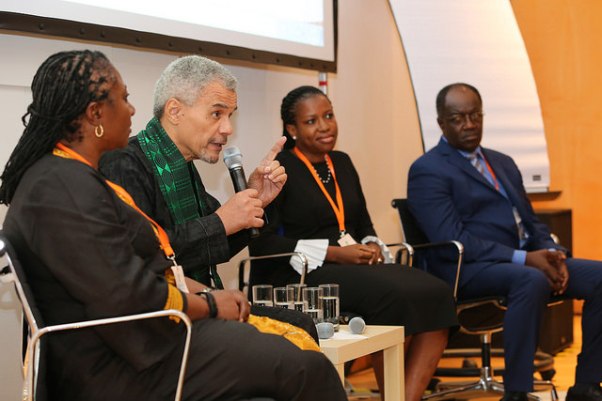Search Results for Tag: WeCyclers
Eco Heroes: A hands-on approach to environmental activism in Africa
At DW’s annual media conference, the Global Media Forum, Nigerian “Eco Heroes” appeared in a panel discussion hosted by Eco@Africa anchor Nneota Egbe to share their ideas and insight into environmental problems affecting Nigeria. The Eco Heroes share a common passion for raising environmental awareness and helping their communities through activism and innovation.
DW’s environmental program Eco@Africa shows the world that environmentally conscious innovation and development starts with people and communities. The coproduction from DW and Channels TV in Nigeria showcases both problems and solutions involving an array of environmental issues in Africa and Europe.
Environmental problems in Nigeria combine social, political and technical issues that the Eco Heroes addressed during their discussion. One pervasive environmental problem in Nigeria is plastic waste. Eco Heroes Bilikiss Adebiyi and Yahaya Ahmed, both take this on in creative and unexpected ways. Coca Cola alone sells around 4 million plastic bottles a week in Nigeria and the empty bottles can be put to good use. Adebiyi created an incentive for recycling by founding WeCyclers – a bicycle-powered recycling service in Lagos for densely populated and low-income neighborhoods. For their recyclable items, households receive reward points that they can exchange for goods and services – keeping plastic out of landfills and raising awareness in the community.
Ahmed, CEO of the Development Association for Renewable Energies (DARE) takes the bottles whole, fills them with sand and uses them in constructing homes, walls and water containers. DARE also looks at the social aspects of environmental problems and recruits people who have had to leave their homes because of increasing desertification.
The Eco Heroes also emphasized that social awareness is a crucial part of environmentalism in Africa. Each of them spoke about putting problems in terms that people can understand. For example, rather than talking about the “environment”, Desmond Majekodunmi said he prefers to think of a “life support system”– an idea that encourages people to act with care. He said educating children on environmental issues and doing simple things like planting trees are tangible ways to address such large problems.
A holistic approach to environmentalism combines social and structural issues. Priscilla Achapka, Executive Director of the Women Environmental Program, warns of a “social time bomb”, as lakes dry out and populations are forced together. Her work focuses on teaching women who run households sustainable solutions to everyday issues, which will create better living spaces in communities that will be growing closer together.
The Eco Heroes agreed that the media is essential for making these complex problems understandable and conveying essential information for environmentally conscious living. They praised DW, Channels TV and Eco@Africa for cooperating and helping to make a valuable contribution to raising awareness and spreading a positive message.
Eco@Africa has also proven to be a big success with audiences Nigeria. And after a successful start there, the show will soon be expanding to Kenya. Kenya Television Network (KTN) will be the new broadcasting partner for the show in East Africa. The expansion will provide a source of information that can make a positive difference to communities across the region. KTN has been a DW programming partner since 2012.





Feedback